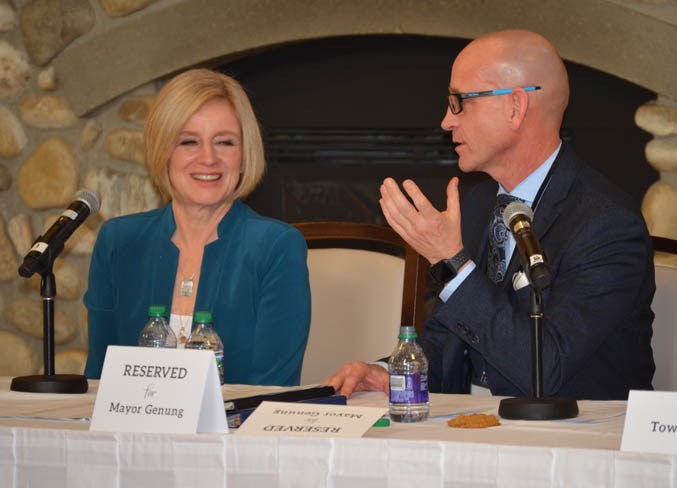Twenty-two municipalities made their case for more sustainable funding to the four provincial party leaders last week.
The Alberta Mid-Sized Cities Mayors’ and CAOs’ Caucus, hosted at the Cochrane RancheHouse, held round table discussions with Alberta Party leader Stephen Mandel, Liberal leader David Khan, UCP leader Jason Kenney and NDP leader Premier Rachel Notley. During the individual sessions, the mayors questioned the leaders on everything from provincial funding for municipalities to attracting more business investment outside Edmonton and Calgary.
Top of mind for the caucus was the need for a provincial funding model similar to the City Charters that have legislated funding levels from the province to Edmonton and Calgary. Currently, municipalities receive annual funding through the Municipal Sustainability Initiative – which is set to expire. Those dollars are spent on expenses such as major infrastructure projects, but the mayors have been critical of the funding model because it lacks stability.
A legislated model, according to the mayors, would allow municipalities to more effectively plan for future projects as well as allow more flexibility when building.
Mayor Jeff Genung said addressing the four leaders was not only an opportunity to hear each party’s take on the issue but to also speak directly to the next premier of the province - whomever voters decide that to be this spring.
In terms of municipal funding, Mandel and Khan had similar platforms. Both committed to working with mid-sized cities to hammer out legislated funding with Mandel adding he would vow to have it in place after his first nine months in office.
Premier Notley and Kenney, whose polls suggest he will form the next government with the UCP, were not as committal to the idea. While both said they understood the need for stable funding and committed to collaborate with the mayors to work out options, neither committed to legislated funding.
Kenney took his comments a step further saying any municipal funding would have to be done in relation to fiscal realities, hinting back to previous comments condemning the rising provincial debt.
Genung wasn’t disheartened by the lack of commitment by the two front runners and emphasized that the municipalities were not simply looking for a cheque.
“We want to be partners,” said Genung, adding the goal is for a predictable agreement similar to Edmonton and Calgary’s that is linked to the economic success of the province.
“I have concerns they will continue to cut the funding but our main focus was to let them know this was our number one issue,” the mayor said.
As it stands, the government’s trajectory, barring any changes after the election, is a little disappointing Genung said. During closed meetings with Shaye Anderson, minister of Municipal Affairs, a decision on the next round of Municipal Sustainability Initiative (MSI) funding won’t be made until October.
“We’re starting our budgeting now,” he said, highlighting the need for an improved funding model.
Coun. Morgan Nagel, who prides himself on being a fiscally responsible councillor, is all for ensuring a predictable funding model but added municipalities need more flexibility in terms of spending. He pointed to GreenTrip funding as an example, saying those dollars should not be earmarked for specific initiatives such as transit.
22/1A interchange
On the Cochrane front, the Highway 1A/Highway 22 interchange is something Genung is hopeful will continue regardless of which party is elected. The NDP have already budgeted for the project, which Genung said has gone through the design phase and is entering procurement.
Whether that project moves forward under the UCP is less certain. Kenney told Genung those decisions will depend on the fiscal situation of the province.
However, while Genung said it is a risk the project will be delayed or fall through under a new government, he suspects it might be too far along to go back on without costing the province more money.
“We’re probably in a good position. I intend to keep the pressure on,” he said.
On the map
Overall Genung said he couldn’t be more pleased over the success of the caucus event and, regardless of the outcomes, he achieved his primary goal - put Cochrane on the map in the minds of the provincial leaders.
“The next premier of Alberta sat beside me for an hour,” he said, adding they’ve now all been to Cochrane and seen firsthand what the community has to offer and what it might need.
He doesn’t intend to let the community stay far from the province’s mind either.
“We need more intergovernmental interaction, not just writing letters and phone calls,” Genung said.



